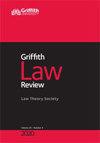Responding to anthropocentrism with anthropocentrism: the biopolitics of environmental personhood
IF 0.9
Q1 LAW
引用次数: 5
Abstract
ABSTRACT This article critically analyses the novelty of the legal personhood of nature and, in particular, whether it signals cracks in the anthropocentrism of Western law. Drawing upon the work of Michel Foucault and Roberto Esposito, it contributes to the theorisation of environmental personhood by focusing on the biopolitical nature of personhood itself. It does so by engaging in a critical examination of the attribution of legal personality to the Whanganui River in Aotearoa New Zealand as the most detailed and sophisticated legislative example to date of legally personifying a natural thing. Working through three key conceptual terms in Foucault’s and Esposito’s work (population, personhood and immunisation), we demonstrate the way in which a biopolitical analysis raises questions about whether ascribing legal personhood to nature addresses anthropocentrism and its effects. We draw attention to the risk of ascribing legal personhood to nature, which is that, instead of signalling an ontological shift in the Western anthropocentric understandings of environment, it operates within and reinforces the dominant legal worldview – unless, that is, the granting of personhood to nature calls into question the dominant paradigm of personhood itself. The article concludes by suggesting alternative ways of developing human understandings of, and relationship with, nature.以人类中心主义回应人类中心主义:环境人格的生物政治
摘要本文批判性地分析了自然法人的新颖性,特别是它是否标志着西方法律的人类中心主义的裂痕。它借鉴了米歇尔·福柯和罗伯托·埃斯波西托的作品,通过关注人格本身的生物政治性质,为环境人格的理论化做出了贡献。它通过对新西兰奥特亚的旺加尼河的法律人格归属进行批判性审查来做到这一点,这是迄今为止将自然事物合法人格化的最详细和最复杂的立法例子。通过福柯和埃斯波西托作品中的三个关键概念术语(人口、人格和免疫),我们展示了生物政治分析提出的问题,即将法人归属于自然是否解决了人类中心主义及其影响。我们提请注意将法人资格归属于自然的风险,即它并没有标志着西方人类中心主义对环境的理解发生了本体论转变,而是在主导的法律世界观中运作并强化了这种世界观——除非,也就是说,将法人资格授予自然会对法人资格本身的主导范式提出质疑。文章最后提出了发展人类对自然的理解以及与自然的关系的替代方法。
本文章由计算机程序翻译,如有差异,请以英文原文为准。
求助全文
约1分钟内获得全文
求助全文

 求助内容:
求助内容: 应助结果提醒方式:
应助结果提醒方式:


